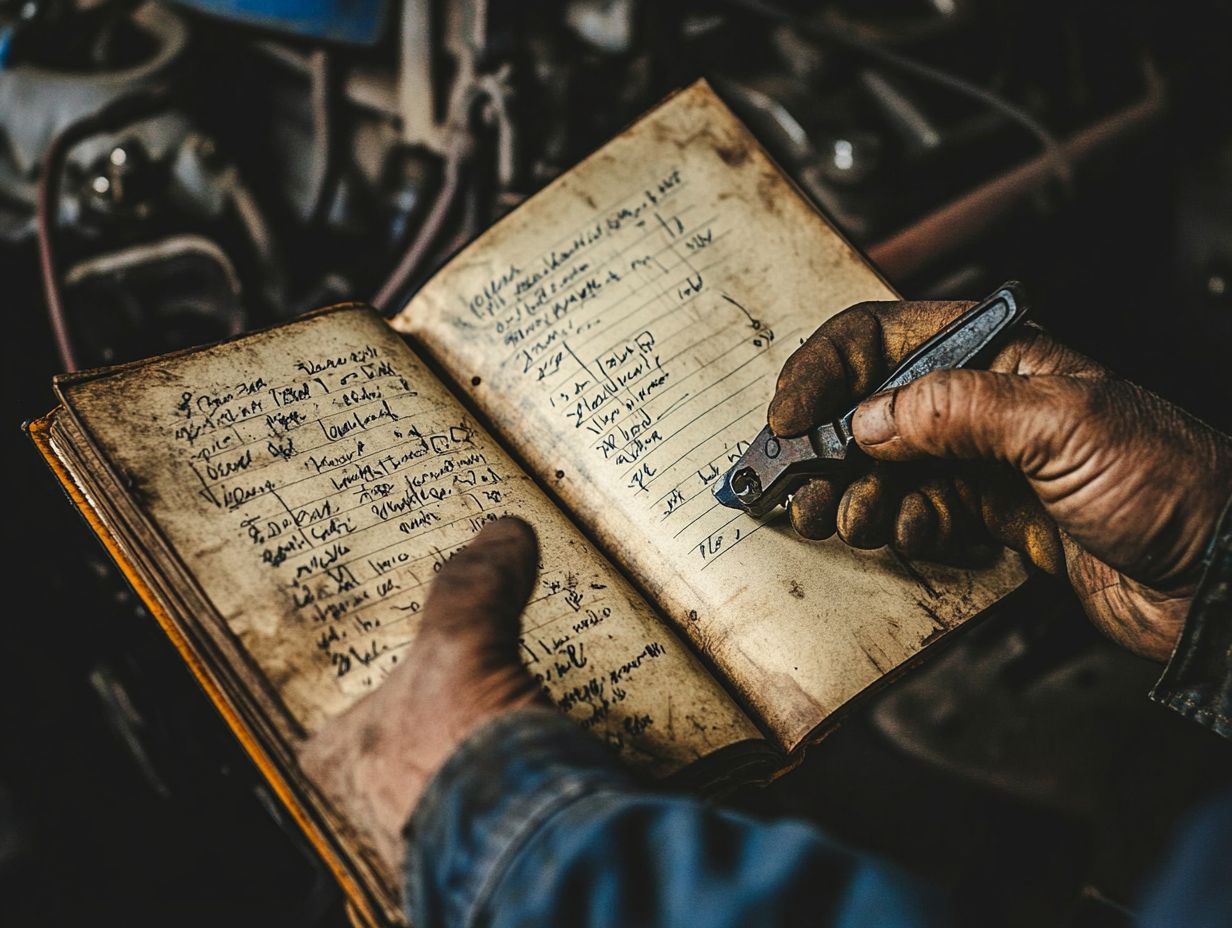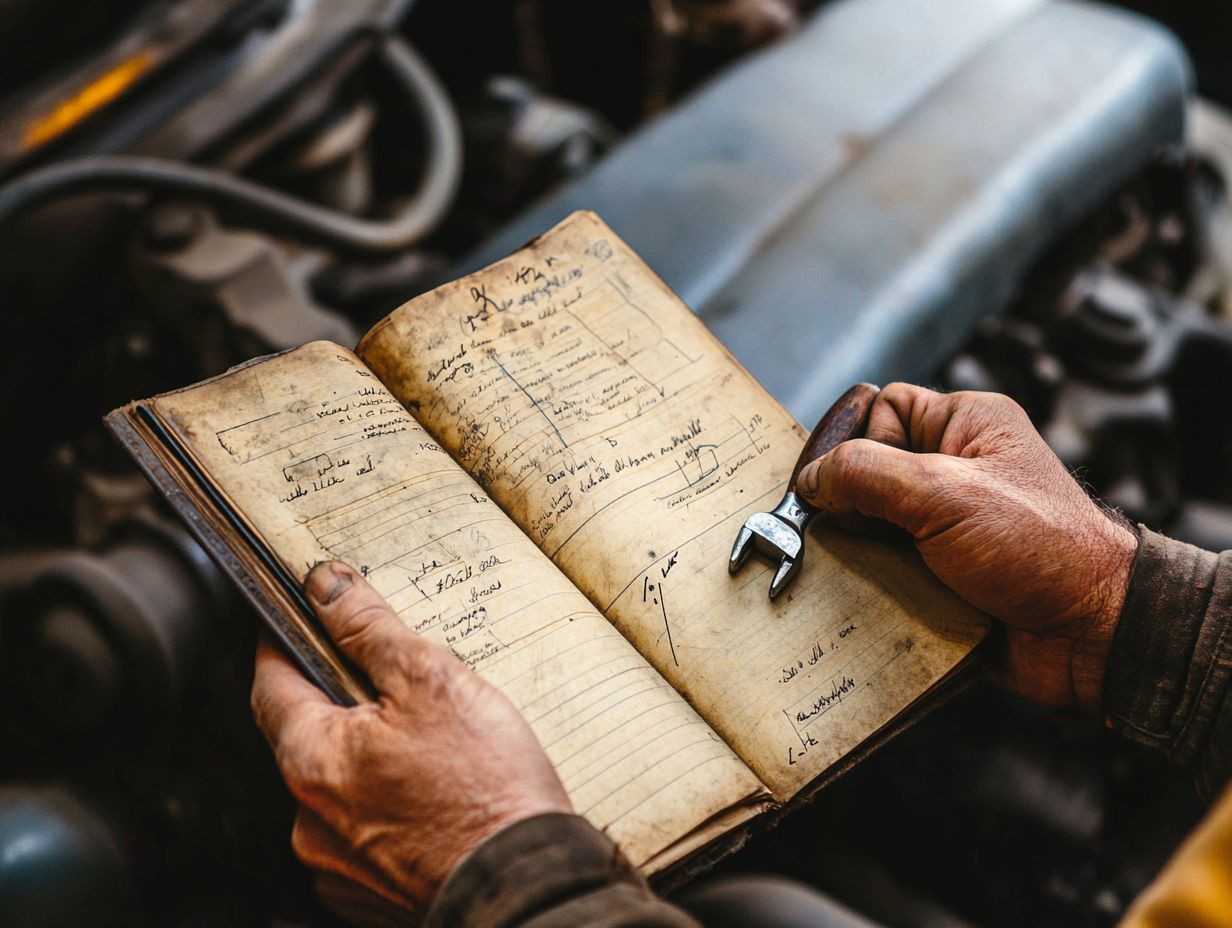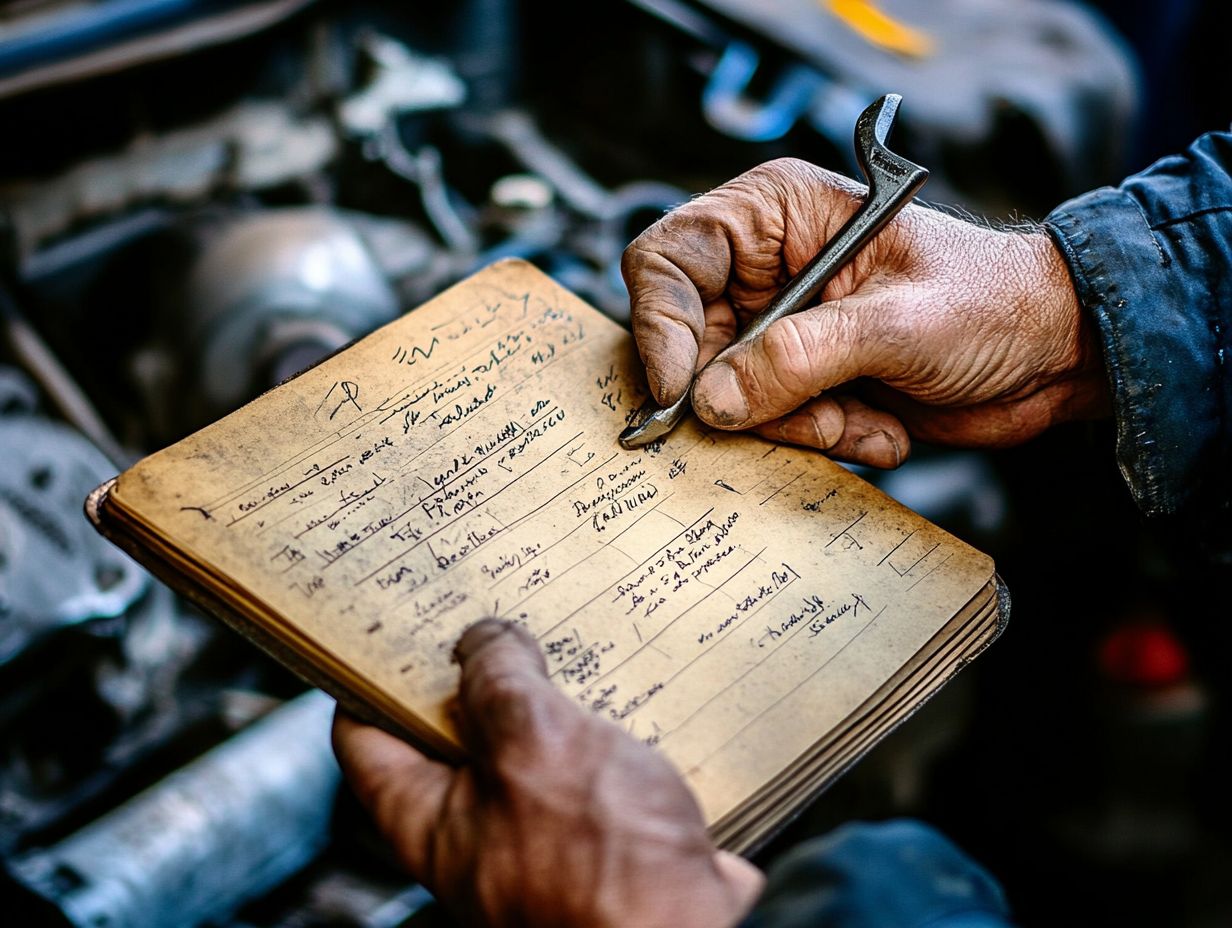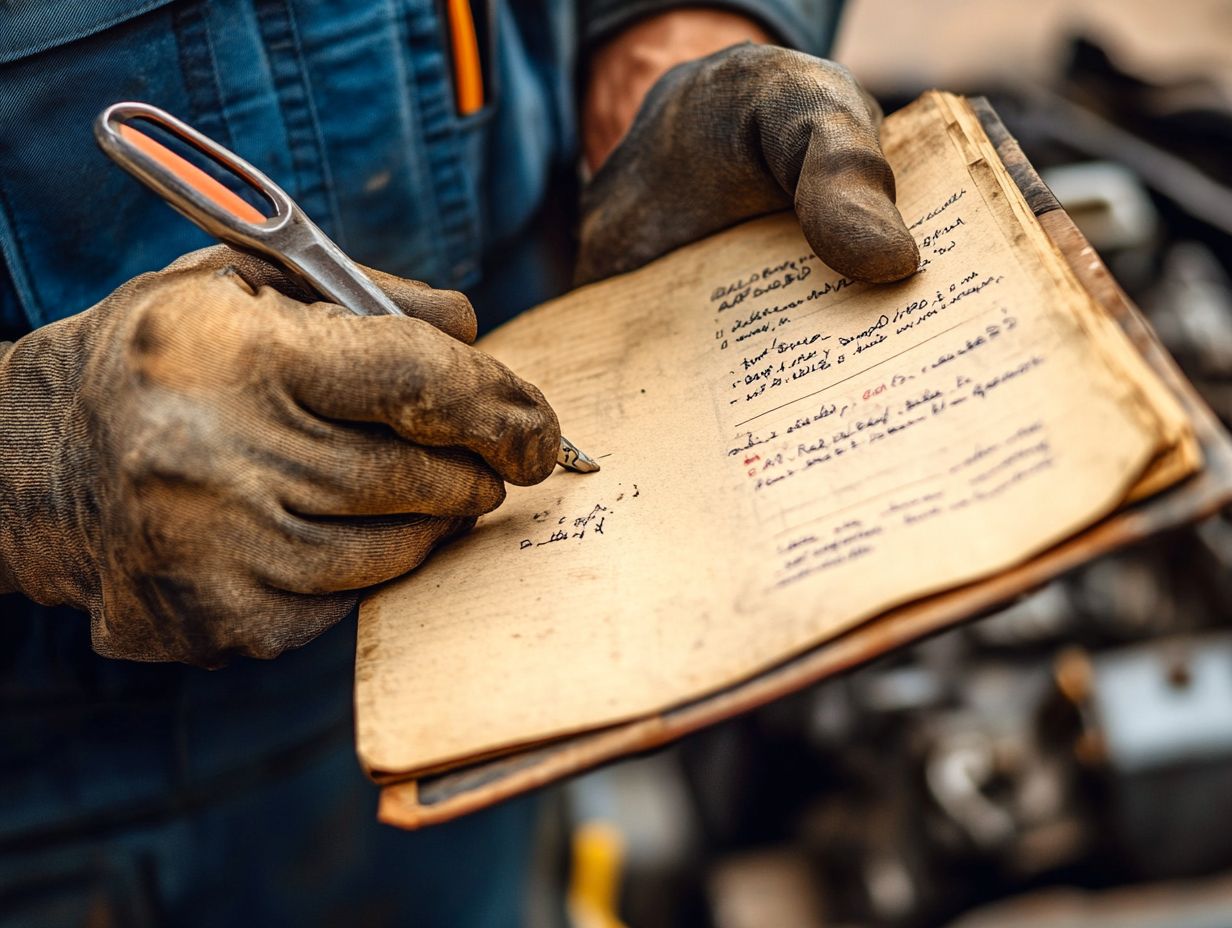How to Assess a Used Car’s Maintenance History
When you re in the market for a used car, grasping its maintenance history is essential for ensuring both long-term performance and value.
A well-documented maintenance record not only reflects the car’s overall health but also serves as a trustworthy indicator of how it has been cared for over the years.
This article delves into the importance of maintenance history, guiding you on where to find these records, which key tasks to prioritize, and how to evaluate the overall quality of care the vehicle has received.
By assessing factors like age and mileage, as well as previous owners and their driving habits, you ll arm yourself with the insights needed to make a well-informed decision.
Contents
- Key Takeaways:
- Why Maintenance History is Important
- Sources for Obtaining Maintenance History
- What to Look for in Maintenance Records
- Assessing the Quality of Maintenance
- Factors to Consider When Evaluating Maintenance History
- Frequently Asked Questions
- 1. How can I assess a used car’s maintenance history?
- 2. What should I look for in a used car’s service records?
- 3. Can I trust a used car’s service records?
- 4. What are some red flags to watch out for in a used car’s maintenance history?
- 5. What if the used car doesn’t come with any service records?
- 6. Is it necessary to assess a used car’s maintenance history before buying?
Key Takeaways:

- Maintaining a used car’s maintenance history is crucial for its performance and resale value.
- Obtain maintenance records from sources like service records, Carfax reports, and dealership maintenance records.
- Look for regular maintenance tasks and important milestones in the maintenance records to assess the car’s upkeep.
- Signs of neglect or poor maintenance, such as inconsistent records or skipped maintenance tasks, can indicate potential issues with the car.
- Consider factors like the age, mileage, previous owners, and driving habits when evaluating a used car’s maintenance history.
Start your journey toward a smart purchase today!
Why Maintenance History is Important
Maintenance history plays a key role in the overall condition and value of a used car, impacting both its performance and future resale potential. A detailed record of the vehicle’s upkeep allows you, as a potential buyer, to gauge its reliability and longevity effectively.
Conversely, inadequate maintenance records can trigger concerns during your purchasing journey.
Understanding the significance of maintenance history empowers you with insights to avoid vehicles with hidden issues, such as prior accidents or undisclosed mechanical problems. This knowledge ultimately guides you toward making a more informed and confident purchase decision.
Impact on Car’s Performance and Value
A well-documented maintenance history significantly enhances your car’s performance and overall value, showcasing your commitment to keeping the vehicle in peak condition.
This meticulous attention to detail not only ensures optimal fuel efficiency allowing your vehicle to consume less gas and ultimately saving you money over time but also plays a crucial role in enhancing its reliability.
A car that has received regular servicing is far less likely to encounter major repairs down the road, leading to a smoother and more enjoyable driving experience.
A well-maintained vehicle also tends to last longer, making it a wise investment.
As potential buyers evaluate a car’s resale value, they are undoubtedly swayed by its pristine condition, which can significantly influence their purchasing decisions.
Sources for Obtaining Maintenance History
Securing the maintenance history of a used car is crucial for making a well-informed purchase. You have several trustworthy sources at your fingertips to access this essential information.
Consider obtaining vehicle history reports from reputable providers like Carfax and AutoCheck. Additionally, dealership reports that detail service history can provide valuable insights into the car’s past.
Where to Find Maintenance Records

Finding maintenance records for a used car can be simple if you know where to look. Key sources are mechanics, dealership records, and vehicle history reports.
As a prospective buyer, explore these sources to secure accurate information. Start by contacting the mechanics who serviced the vehicle.
They keep records of oil changes, tire rotations, and repairs.
Dealership reports reveal warranty services and any manufacturer recalls. Comprehensive vehicle history reports provide insights into accidents, title transfers, and prior ownership.
By checking multiple sources, you can make an informed decision and acquire a vehicle that has been well cared for.
What to Look for in Maintenance Records
When reviewing maintenance records, focus on key tasks like oil changes, brake replacements, and major services, such as timing belt replacements. This information can guide you in making a wise choice.
Key Maintenance Tasks and Milestones
Regular oil changes and brake inspections are essential for your vehicle’s health. They help ensure smooth operation and extend its lifespan.
Timely oil changes prevent engine wear, optimizing performance and fuel efficiency. Brake inspections are vital for your safety neglecting them can lead to accidents!
Following timelines for components like the timing belt prevents costly repairs due to engine failure. These maintenance activities protect your vehicle and everyone on board.
Assessing the Quality of Maintenance
As a potential buyer, evaluating the quality of maintenance a used car has received is crucial. This assessment can reveal signs of neglect or poor care that may lead to expensive repairs later.
Signs of Neglect or Poor Maintenance

Signs of neglect can indicate potential future troubles, such as missing documentation for significant repairs. Look for visible rust on the body, which suggests moisture exposure without adequate care.
Check for uneven tire wear, which may indicate alignment issues. A poorly maintained interior, with stains or tears, also shows a lack of attention.
Finally, inspect the engine bay. It should be clean and free from excessive oil leaks. An untidy engine compartment often reflects broader neglect.
By recognizing these signs, you can make a better-informed decision about your potential purchase!
Factors to Consider When Evaluating Maintenance History
When assessing a used car’s maintenance history, consider its age, mileage, number of previous owners, and overall condition. Each factor profoundly influences reliability and resale value.
Age and Mileage of the Car
The age and mileage of a used car are important factors that can significantly influence its maintenance history and overall reliability.
If you’re considering an older vehicle with high mileage, be aware that it may have different maintenance needs and potential concerns.
As these factors accumulate, they can indicate impending wear and tear on key components like the engine, transmission, and brakes. For example, if a car has been driven extensively, it might require more frequent oil changes, tire replacements, and brake inspections than its less-traveled peers.
Age can also cause issues such as corrosion or outdated technology, which can affect both performance and safety features.
As a buyer, keep in mind that while a high-mileage vehicle may come with a lower upfront cost, it could lead to unexpected repair expenses down the line. Conducting thorough inspections before making a purchase is essential to ensure you make a wise investment.
Previous Owners and Driving Habits
The number of previous owners and their driving habits can greatly influence a used car’s maintenance history. Cars subjected to harsh conditions often require more frequent and intensive repairs.
Take, for example, vehicles primarily used in city environments. They frequently endure stop-and-go traffic, leading to accelerated wear on crucial components like brakes and engines.
Short trips, which are common for urban drivers, can prevent the engine from reaching optimal temperature the best temperature for the engine to run efficiently complicating wear and tear on essential parts.
On the flip side, cars that have spent most of their time on highways typically show less strain and often require less routine maintenance. Understanding the previous owners’ driving styles whether they favored aggressive acceleration or gentle cruising can provide invaluable insight into potential future maintenance needs.
Frequently Asked Questions

1. How can I assess a used car’s maintenance history?
To assess a used car’s maintenance history, start by reviewing the vehicle’s service records. These should document all of the car’s previous maintenance and repairs, and you can also refer to a detailed guide on how to evaluate a used car’s condition for further insights.
Perform a thorough visual inspection to check for signs of neglect or major issues.
2. What should I look for in a used car’s service records?
When reviewing service records, pay attention to the frequency and consistency of maintenance. Look for regular oil changes, tire rotations, and other routine maintenance.
Also, check for any major repairs or replacements that may have been done.
3. Can I trust a used car’s service records?
While service records are a good starting point, don’t take them at face value. Verify their authenticity and ensure they match up with the car’s reported mileage.
You can also request a vehicle history report for a more comprehensive overview of the car’s maintenance history.
4. What are some red flags to watch out for in a used car’s maintenance history?
- Long gaps between service records
- A history of major repairs or replacements
- Inconsistent or incomplete records
These could indicate a lack of proper maintenance or potential underlying issues with the car.
5. What if the used car doesn’t come with any service records?
If the used car you’re interested in doesn’t come with service records, request them from the seller or dealership. If they’re unable to provide them, ask for a discount or consider getting a professional inspection to assess the car’s condition and potential issues.
6. Is it necessary to assess a used car’s maintenance history before buying?
Yes, it is highly recommended to assess a used car’s maintenance history before making a purchase. Knowing what to know about car maintenance records can help you understand that a car with a well-documented and consistent maintenance history is more likely to be reliable and have fewer underlying issues.
This assessment can also help you negotiate a fair price for the car based on its maintenance record.






